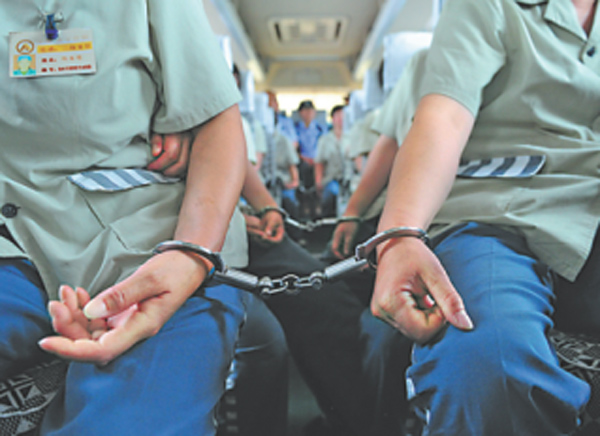Prisoners in line to be granted special amnesties
Updated: 2015-08-25 07:14
By CAO YIN(China Daily)
|
|||||||||||
 |
|
Criminal justice: Felons convicted of serious corruption would be prohibited from seeking shorter sentences, under a third reading of the draft amendment to the Criminal Law. The amendment aims to "safeguard judicial fairness". China Daily |
A draft decision on setting four types of prisoners free by special amnesty was submitted to China's top legislature on Monday.
Under the draft, four categories of inmates who were sentenced before Jan 1 and who do not pose a threat to society will be granted the special amnesty.
The proposal was announced by Li Shishi, director of the Legal Affairs Committee under the Standing Committee of the National People's Congress.
Prisoners who took part in the War of Resistance against Japanese Aggression (1937-45) and the Chinese War of Liberation (1946-49) before committing their crimes are expected to be released under the special pardon, according to the draft.
Inmates who helped fight foreign invaders and contributed to protecting national sovereignty, security and territorial integrity after the People's Republic of China was founded in 1949 would also be pardoned, including those who fought in the War to Resist US Aggression and Aid Korea (1950-53).
But prisoners in the second category who are guilty of serious crimes such as bribery, corruption and terrorism, and repeat offenders and principal criminals involved in gang-related offenses, are excluded, according to the draft.
Li said the move targeting the two types of prisoners is aimed at marking the 70th anniversary of victory in World War II, and can be viewed as innovatively implementing the Constitution.
The amnesty proposal also covers inmates who are older than 75 with serious physical disabilities and who cannot live on their own.
Those who committed crimes when they were under 18 and received a maximum sentence of three years in prison, or minors whose prison terms are less than a year would also be set free under the proposed amnesty. But those convicted of serious crimes, such as rape and homicide, are excluded, the draft states.
Amnesties are often announced before major national ceremonies and have been granted seven times since 1949. The last time the country applied a special amnesty was in 1975.
The Standing Committee will make a final decision on whether to pass the draft on Saturday. If it is approved, intermediate people's courts and high people's courts will decide those who will qualify and the process will also be supervised by prosecutors, Li said.
The commission said it is not possible yet to estimate the number of prisoners who will be freed.
Gao Mingxuan, a leading criminal law professor at Beijing Normal University, hailed the draft decision, saying it is good for the nation to build an open, democratic and civilized legal image.
The proposal not only implements the rule of law put forward by the leadership in 2013, but will also help to maintain the authority of the Constitution, Gao said.
"The proposed amnesty for elderly prisoners and for minors reflects our country's respect for and protection of human rights. It is also a vital move to enforce the principle of tempering justice with mercy under the Criminal Law," he said.
Zhao Bingzhi, another criminal law professor at the university, said the amnesty will encourage prisoners to strictly abide by prison rules and to receive education.
Chu Huaizhi, a law professor at Peking University, said the proposal to free prisoners who took part in the War of Resistance against Japanese Aggression shows the government's determination to safeguard world peace and to maintain national security.
Some prisoners excluded
The range of prisoners who can be freed by the special amnesty that was submitted to China's top legislature on Monday is strictly in line with the law and fully takes into account those who may pose a risk to society after their release, judicial experts said.
Under the draft decision on the special amnesty, criminals who participated in wars to safeguard national sovereignty, security and territorial integrity after the People's Republic of China was founded in 1949 will be set free, but prisoners found guilty of some serious crimes are excluded.
The serious crimes cover corruption, bribery, homicide, rape, robbery, kidnap, arson, explosions and use of dangerous substances such as radioactive materials, the proposal said.
Meanwhile, recidivists, inmates who were the principal criminals in gang-related crimes, or those whose conviction is related to terrorism and damaging to national security will also be excluded from the amnesty.
Chu Huaizhi, a law professor at Peking University, approved of the clear restrictions on the range of the special amnesty as set out in the draft.
"Excluding prisoners serving sentences for graft and bribery shows our leadership's determination to fight corruption," Chu said.
Wang Ping, a law professor at China University of Political Science and Law, said the exclusion of some prisoners invovled in homicide, rape and terrorism, is reasonable.
Related Stories
Top lawmakers mull amnesty for prisoners who took part in wars 2015-08-24 18:15
Myanmar grants amnesty to 6,966 prisoners including Chinese loggers 2015-07-30 13:59
Chinese youth shun immigration amnesty 2015-02-11 11:34
Ukraine offers amnesty to pro-Russian separatists 2014-04-11 06:35
Amnesty for corruption? 2014-01-08 09:55
Today's Top News
China equities collapse sparks global markets sell-off
Top lawmakers mull amnesty for prisoners who took part in wars
UK airshow crash toll to rise
Stocks plunge most since 2007 as support measures fail
Hugo Award to open new chapter for Chinese sci-fi
Britain reopens embassy in Tehran
Frace raises vigilance after
train shooting
Greek opposition tries to form government
Hot Topics
Lunar probe , China growth forecasts, Emission rules get tougher, China seen through 'colored lens', International board,
Editor's Picks

|

|

|

|

|

|






